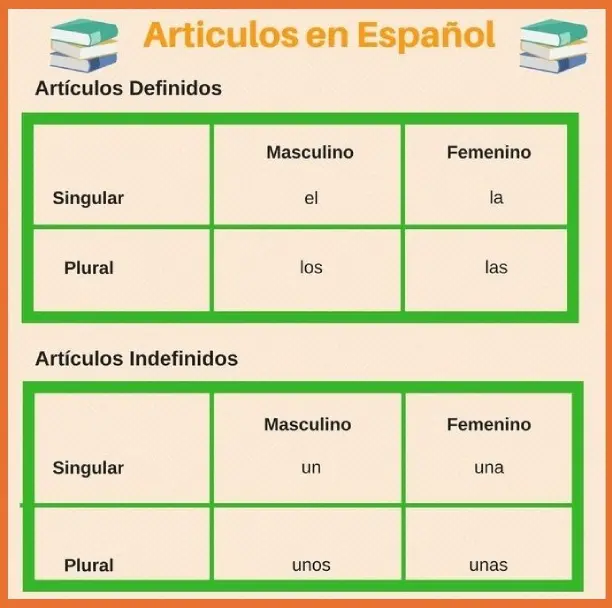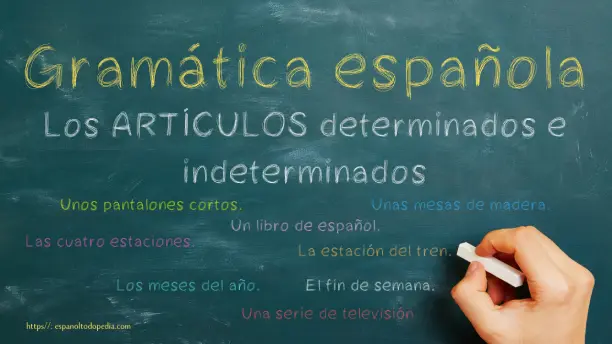In Spanish, we use small words called articles to talk about people, things, or places. Articles are very important because they accompany nouns and tell us if we are talking about something known or something new. There are two types: definite and indefinite.
- The definite articles are el, la, los, las. We use these when the person or thing is already known to everyone in the conversation. For example: la casa de mi amiga (my friend’s house) or los estudiantes de la clase (the students of the class).
- The indefinite articles are un, una, unos, unas. We use these when we talk about something for the first time or in a general way. For example: una casa bonita (a beautiful house) or unos libros interesantes (some interesting books).
In addition, articles help us identify the gender of words: masculine or feminine. In the accompanying video, you will learn more about their forms and uses with clear and simple examples. Let’s start!
Definite and Indefinite Articles in Spanish
Well, I hope you found the video helpful. Watch it again, take note of the most essential points, and don’t forget to repeat the examples out loud to improve your pronunciation. Now let’s review some important information about articles in Spanish 👍
Let’s review how Spanish articles work

Definite articles in Spanish
You come across many instances in Spanish where you use the definite article even though you may or may not use it in English. The rules in the following list show how you use definite articles in Spanish:
01. With nouns in a general or abstract sense:
El amor es maravilloso. (Love is wonderful.)
02. With nouns in a specific sense:
La tía Ana trae regalos. (Aunt Ana brings gifts.)
03. With names of languages (except after the verb hablar and after the prepositions de and en):
Me gusta el español. (I like Spanish.)
04. With parts of the body (when the possessor is precise) in place of the possessive adjective:
Me duelen los pies. (My feet hurt.)
05. With titles and ranks when you aren’t addressing the person:
La señora Rivera está aquí. (Mrs. Rivera is here.)
Siéntese, Señora Rivera. (Have a seat, Mrs. Rivera.)
06. With last names:
Los Gómez viven en Colombia. (The Gómezes live in Colombia.)
07. With days of the week (except after the verb ser):
El domingo voy a México. (On Sunday, I’m going to Mexico.)
Hoy es miércoles. (Today is Wednesday.)
08. With seasons (you may omit the article after en):
No trabajo en (el) verano. (I don’t work in the summer.)
09. With the hour of the day and other time expressions:
Son las once y media. (It’s 11:30.)
Salgo por la tarde. (I’m going out in the afternoon.)
10. With rivers, seas, and other geographical locations:
El Orinoco es un río. (The Orinoco is a river.)
Unlike English, we don’t use indefinite articles in Spanish 😱:
1. With nouns of occupation, nationality, or religion after ser (to be) or hacerse (to become):
Soy estudiante (I am a student).
Cristiano Ronaldo es futbolista (Cristiana Ronando is a football player).
Mis abuela es católica (My grandmother’s a Catholic).
Unless those nouns have additional information about them:
Carlos es un buen estudiante (Carlos is a good student).
Cristiano Ronaldo es un futbolista portugués (Cristiano Ronaldo is a Portuguese football player).
2. After buscar (to look for), comprar (to buy), llevar (to wear), tener (to have), and usar (to use) when talking about something you would typically only have one of:
Busco empleo (I am looking for a job).
Lleva falsa (She’s wearing a skirt).
No tiene coche (He does not have a car)
Unless the noun includes extra information:
Busco un empleo interesante (I’m looking for an interesting job).
Lleva una falda muy bonita (She’s wearing a lovely skirt).
Tiene un coche azul (He has a blue car).
3. Before mil, cien, medio:
Lo he dicho mil veces (I’ve said it a thousand times).
Hay cien personas (There are a hundred people).
Compré un kilo y medio de naranjas (I bought a kilo and a half of apples).
4. Before otro:
Dame otro libro (Give me another book).
¿Quieres otra cerveza? (Do you want another beer?).
5. After qué in exclamations:
¡Qué buena idea! ( What a good idea!).
¡Qué pena! (What a shame!).
The gender of nouns
Now, let’s see how to identify the gender of words and learn which article to use.
